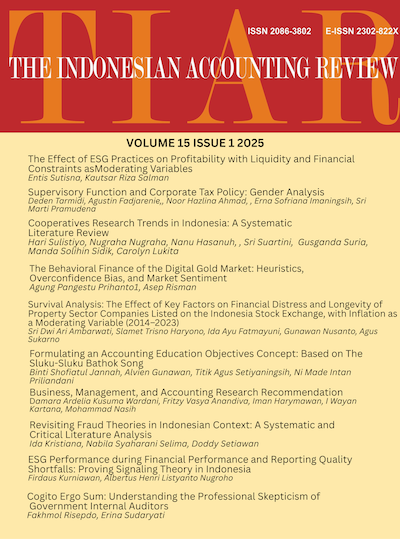ESG Performance during Financial Performance and Reporting Quality Shortfalls: Proving Signaling Theory in Indonesia
DOI:
https://doi.org/10.14414/tiar.v15i1.5246Keywords:
ESG Performance, Financial Performance, Financial Shortfall, Financial Condition, Signaling Theory, Signaling MechanismAbstract
This study aims to examine the inverse relationship between financial performance shortfalls and corporate ESG performance to determine whether companies exploit biases that can be created by using corporate ESG performance as a signaling mechanism. The sample of this study consists of companies listed on the Indonesia Stock Exchange from 2000 to 2023. The final sample includes 450 company-year observations. The results of this study indicate that there is a negative correlation between the decline in short-term financial performance and the company's ESG performance. In addition, corporate stakeholders in developing countries, such as Indonesia, still lack confidence and trust in company’s environmental, social, and governance (ESG) strategies, which contributes to the less effective performance of ESG as a signaling mechanism for companies in Indonesia. In addition to contributing to investor decision-making processes focused on issues related to corporate environmental and social sustainability, the results of this study are also expected to help investors and regulators understand environmental, social, and governance (ESG) activity patterns when companies face financial performance shortfalls. Finally, this study provides theoretical validation of signaling theory in the context of developing countries, specifically Indonesia.
References
Ahmad, N., Mobarek, A., Roni, N. N., & Tan, A. W. K. (2021). Revisiting the impact of ESG on financial performance of FTSE350 UK firms: Static and dynamic panel data analysis. Cogent Business & Management, 8(1). https://doi.org/10.1080/23311975.2021.1900500
Altman, E. I. (2005). An emerging market credit scoring system for corporate bonds. Emerging Markets Review, 6(4), 311-323. https://doi.org/10.1016/j.ememar.2005.09.007
Bae, S., Masud, M., & Kim, J. (2018). A Cross-Country Investigation of Corporate Governance and Corporate Sustainability Disclosure: A Signaling Theory Perspective. Sustainability, 10(8). https://doi.org/10.3390/su10082611
Bergh, D. D., Connelly, B. L., Ketchen Jr, D. J., & Shannon, L. M. (2014). Signalling theory and equilibrium in strategic management research: An assessment and a research agenda. Journal of management studies, 51(8), 1334-1360.
Bromiley, P., & Harris, J. D. (2014). A comparison of alternative measures of organizational aspirations. Strategic Management Journal, 35(3), 338-357. https://doi.org/10.1002/smj.2191
Cheng, B., Ioannou, I., & Serafeim, G. (2013). Corporate social responsibility and access to finance. Strategic Management Journal, 35(1), 1-23. https://doi.org/10.1002/smj.2131
Ching, H. Y., & Gerab, F. (2017). Sustainability reports in Brazil through the lens of signaling, legitimacy and stakeholder theories. Social Responsibility Journal, 13(1), 95-110. https://doi.org/10.1108/srj-10-2015-0147
Cho, C. H., Michelon, G., Patten, D. M., & Roberts, R. W. (2015). CSR disclosure: the more things change…? Accounting, Auditing & Accountability Journal, 28(1), 14-35. https://doi.org/10.1108/aaaj-12-2013-1549
Connelly, B. L., Certo, S. T., Ireland, R. D., & Reutzel, C. R. (2010). Signaling Theory: A Review and Assessment. Journal of Management, 37(1), 39-67. https://doi.org/10.1177/0149206310388419
Dalziel, T., Gentry, R. J., & Bowerman, M. (2011). An Integrated Agency–Resource Dependence View of the Influence of Directors' Human and Relational Capital on Firms' R&D Spending. Journal of Management Studies, 48(6), 1217-1242. https://doi.org/10.1111/j.1467-6486.2010.01003.x
DasGupta, R. (2022). Financial performance shortfall, ESG controversies, and ESG performance: Evidence from firms around the world. Finance Research Letters, 46. https://doi.org/10.1016/j.frl.2021.102487
DasGupta, R., & Dhochak, M. (2021). Risk-Antecedents of Firms and Strategic Mediators – New Evidence from a Cross-Country Analysis. American Business Review, 24(1), 3-35. https://doi.org/10.37625/abr.24.1.3-35
Doh, J. P., Howton, S. D., Howton, S. W., & Siegel, D. S. (2009). Does the Market Respond to an Endorsement of Social Responsibility? The Role of Institutions, Information, and Legitimacy. Journal of Management, 36(6), 1461-1485. https://doi.org/10.1177/0149206309337896
Eccles, R. G., Ioannou, I., & Serafeim, G. (2014). The Impact of Corporate Sustainability on Organizational Processes and Performance. Management Science, 60(11), 2835-2857. https://doi.org/10.1287/mnsc.2014.1984
Ferrell, A., Liang, H., & Renneboog, L. (2016). Socially responsible firms. Journal of Financial Economics, 122(3), 585-606. https://doi.org/10.1016/j.jfineco.2015.12.003
Flammer, C. (2013). Corporate Social Responsibility and Shareholder Reaction: The Environmental Awareness of Investors. Academy of Management Journal, 56(3), 758-781. https://doi.org/10.5465/amj.2011.0744
Freeman, R. E. (2010). Strategic management: A stakeholder approach. Cambridge university press.
Gavetti, G., Greve, H. R., Levinthal, D. A., & Ocasio, W. (2012). The Behavioral Theory of the Firm: Assessment and Prospects. The Academy of Management Annals, 6(1), 1-40. https://doi.org/10.5465/19416520.2012.656841
Gujarati, D. N., & Porter, D. C. (2021). Essential of Econometrics (Forth Edition ed.). The McGraw-Hill.
Huang, D. Z. X. (2021). Environmental, social and governance factors and assessing firm value: valuation, signalling and stakeholder perspectives. Accounting & Finance, 62(S1), 1983-2010. https://doi.org/10.1111/acfi.12849
Huang, D. Z. X. (2022). Environmental, social and governance factors and assessing firm value: Valuation, signalling and stakeholder perspectives. Accounting & Finance, 62, 1983-2010.
Jamali, D., & Karam, C. (2018). Corporate social responsibility in developing countries as an emerging field of study. International journal of management reviews, 20(1), 32-61.
Karnani, A. (2011). “Doing Well by Doing Good”: The Grand Illusion. California Management Review, 53(2), 69-86. https://doi.org/10.1525/cmr.2011.53.2.69
Koundouri, P., Pittis, N., & Plataniotis, A. (2021). The Impact of ESG Performance on the Financial Performance of European Area Companies: An Empirical Examination Icsd 2021,
Kurniawan, F., Amanati, H. T., Nugroho, A. H. L., & Pusparini, N. O. (2024). Effects of policy and economic uncertainty on investment activities and corporate financial reporting: a study of developing countries in Asia-Pacific. Asian Review of Accounting, 32(3), 373-393.
Kurniawan, F., Pusparini, N. O., Amanati, H. T., & Nugroho, A. H. L. (2022). A Cross Country Analysis of Financial Conditions and Earnings Management: Evidence from Asia Continent. JASF: Journal of Accounting and Strategic Finance, 5(1), 134-150.
Lee, M.-T. (2016). Corporate social responsibility and stock price crash risk: Evidence from an Asian emerging market. Managerial Finance, 42(10), 963-979.
Lucas, G. J. M., Knoben, J., & Meeus, M. T. H. (2015). Contradictory yet Coherent? Inconsistency in Performance Feedback and R&D Investment Change. Journal of Management, 44(2), 658-681. https://doi.org/10.1177/0149206315584821
Lys, T., Naughton, J. P., & Wang, C. (2015). Signaling through corporate accountability reporting. Journal of Accounting and Economics, 60(1), 56-72. https://doi.org/10.1016/j.jacceco.2015.03.001
Mavlanova, T., Benbunan-Fich, R., & Koufaris, M. (2012). Signaling theory and information asymmetry in online commerce. Information & Management, 49(5), 240-247. https://doi.org/https://doi.org/10.1016/j.im.2012.05.004
Naeem, N., Cankaya, S., & Bildik, R. (2022). Does ESG performance affect the financial performance of environmentally sensitive industries? A comparison between emerging and developed markets. Borsa Istanbul Review, 22, S128-S140. https://doi.org/10.1016/j.bir.2022.11.014
Naimy, V., El Khoury, R., & Iskandar, S. (2021). ESG Versus Corporate Financial Performance: Evidence from East Asian Firms in the Industrials Sector. Studies of Applied Economics, 39(3). https://doi.org/10.25115/eea.v39i3.4457
Osagie, E. R., Wesselink, R., Blok, V., Lans, T., & Mulder, M. (2016). Individual competencies for corporate social responsibility: A literature and practice perspective. Journal of business ethics, 135, 233-252.
Paulraj, A. (2011). Understanding the relationships between internal resources and capabilities, sustainable supply management and organizational sustainability. Journal of Supply Chain Management, 47(1), 19-37.
Peng, L. S., & Isa, M. (2020). Environmental, social and governance (ESG) practices and performance in Shariah firms: agency or stakeholder theory? Asian Academy of Management Journal of Accounting & Finance, 16(1).
Putri, R. N., Putri, J. K., Christanti, R., & Nugroho, A. H. L. (2024). Investigating the impact of green banking on efficiency strategy: Evidence from Indonesia. The Indonesian Journal of Accounting Research, 27(1), 157-178.
Rivoli, P., & Waddock, S. (2011). “First They Ignore You…”: The Time-Context Dynamic and Corporate Responsibility. California Management Review, 53(2), 87-104. https://doi.org/10.1525/cmr.2011.53.2.87
Shi, W., & Veenstra, K. (2020). The Moderating Effect of Cultural Values on the Relationship Between Corporate Social Performance and Firm Performance. Journal of Business Ethics, 174(1), 89-107. https://doi.org/10.1007/s10551-020-04555-9
Shinkle, G. A. (2011). Organizational Aspirations, Reference Points, and Goals. Journal of Management, 38(1), 415-455. https://doi.org/10.1177/0149206311419856
Spence, M. (1978). Job market signaling. In Uncertainty in economics (pp. 281-306). Elsevier.
Spence, M. (2002). Signaling in Retrospect and the Informational Structure of Markets. The American Economic Review, 92(3), 434-459. http://www.jstor.org/stable/3083350
Su, W., Peng, M. W., Tan, W., & Cheung, Y.-L. (2014). The Signaling Effect of Corporate Social Responsibility in Emerging Economies. Journal of Business Ethics, 134(3), 479-491. https://doi.org/10.1007/s10551-014-2404-4
Sumiyana, S., Na’im, A., Kurniawan, F., & Nugroho, A. H. L. (2023). Earnings management and financial distress or soundness determining CEOs’ future over- and under-investment decisions. Humanities and Social Sciences Communications, 10(1). https://doi.org/10.1057/s41599-023-01638-6
Sumiyana, S., Naق│└im, A., Nugroho, A. H., & Kurniawan, F. (2023). Multiple measurements of CEOsق│└ overconfidence and future earnings management: evidence from Asia-Pacific developing countries. Humanities and Social Sciences Communications, 10(1), 1-11.
Taj, S. A. (2016). Application of signaling theory in management research: Addressing major gaps in theory. European Management Journal, 34(4), 338-348. https://doi.org/10.1016/j.emj.2016.02.001
Toth, Z., Naudأ╚, P., Henneberg, S. C., & Diaz Ruiz, C. A. (2021). The strategic role of corporate online references: building social capital through signaling in business networks. Journal of Business & Industrial Marketing, 36(8), 1300-1321.
Velte, P. (2017). Does ESG performance have an impact on financial performance? Evidence from Germany. Journal of Global Responsibility, 8(2), 169-178. https://doi.org/10.1108/jgr-11-2016-0029
Visser, W. (2008). 473 Corporate Social Responsibility in Developing Countries. In The Oxford Handbook of Corporate Social Responsibility (pp. 0). Oxford University Press. https://doi.org/10.1093/oxfordhb/9780199211593.003.0021
White, T. L., Hodge, G. R., White, T. L., & Hodge, G. R. (1989). Best Linear Unbiased Prediction: Applications. Predicting Breeding Values with Applications in Forest Tree Improvement, 300-327.
Xie, J., Nozawa, W., Yagi, M., Fujii, H., & Managi, S. (2018). Do environmental, social, and governance activities improve corporate financial performance? Business Strategy and the Environment, 28(2), 286-300. https://doi.org/10.1002/bse.2224
Yasar, B., Martin, T., & Kiessling, T. (2020). An empirical test of signalling theory. Management Research Review, 43(11), 1309-1335. https://doi.org/10.1108/mrr-08-2019-0338
Downloads
Submitted
Published
How to Cite
Issue
Section
License
Copyright (c) 2025 The Indonesian Accounting Review

This work is licensed under a Creative Commons Attribution-NonCommercial 4.0 International License.

















